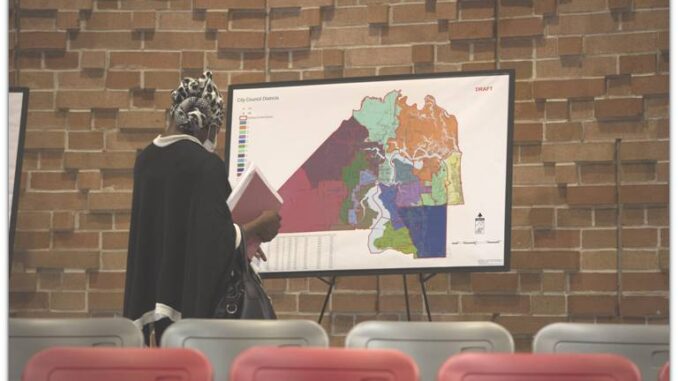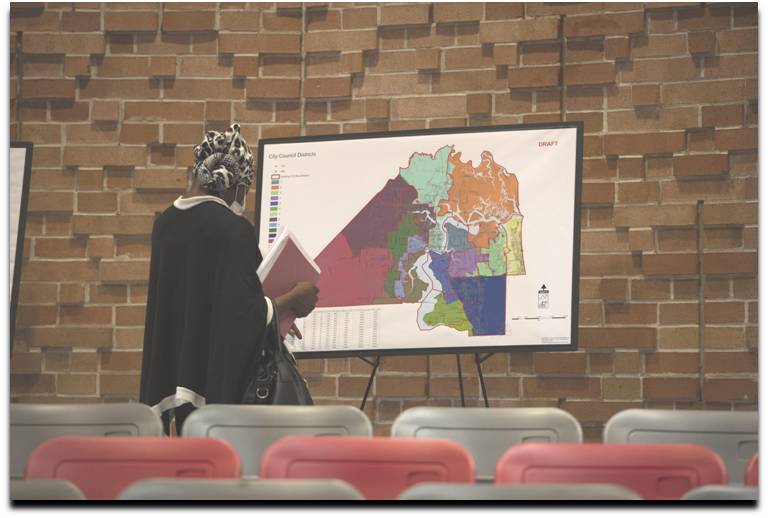

The Jacksonville City Council Rules Committee approved new City Council and School Board maps on a 6-to-1 vote, sending the plans to the full council for a vote, likely next week.
The committee approved a minor amendment that moved about 400 people from District 3 to District 13 near Atlantic Boulevard and San Pablo Road.
But the City Council and School Board maps retain the features that were most criticized when hundreds of residents came to public hearings last month.
It still splits 47 neighborhoods. It still packs a majority of Black residents into four districts. It still never assessed the districts’ compactness.
Rules Chair Councilwoman Brenda Priestly Jackson said she didn’t hear any complaints about the maps until August or September. The city presented its first full map proposal in September.
She said that when she initially said she was comfortable with keeping the current map intact with as few changes as possible, that’s because no one had raised concerns to her about the district shapes.
She said she couldn’t find a single email from a resident of District 10, which she represents, complaining about the current council maps in the months before the new proposals.
But in 2019, when she ran for office, she herself criticized the shape of the districts in an interview with The Florida Times-Union, saying, “We can’t have these districts snip all around.”
During meetings she hosted during the redistricting process, she barred public comment.
But council members praised Priestly Jackson for hosting an extra public hearing. City law requires three, but she held four over the course of four weeks.
Her guiding principle in this round of redistricting, which saw a majority of Black residents continue to be placed in four of the city’s 14 districts, was “do no harm,” she said.
Only Councilman Rory Diamond voted against the plan, saying that it did a good job of keeping the Beaches intact but he was concerned that the process prioritized protecting incumbents and making as few changes as possible.
Planning Director Bill Killingsworth, who drew the maps for the city, said that while the council prioritized protecting incumbents, that wasn’t a major factor in drawing the districts. But that’s because they were already prioritizing making as few changes as possible.
Activists have threatened to sue over racial gerrymandering claims if the city didn’t amend the maps.
At the meeting, city attorney Paige Johnston said the maps would “likely prevail” if someone sued the city.
Councilman Garrett Dennis, who led the redistricting committee before the census data was released, said he wanted the city to start from scratch during redistricting, instead of making as few changes as possible. But he said that the delayed release of the census data gave them a tighter deadline.
That’s not true.
In fact, the city, which won’t implement the maps until the 2023 elections, had the same deadline as it would have if the census data were released on time.
Priestly Jackson said she is open to exploring changes to how the city handles redistricting. She didn’t say what changes those may be.
Some Florida municipalities hand redistricting to independent commissions. The Legislature’s Fair Districts standards bar it from considering incumbency or political benefit.
If the City Council wants to make further changes to the redistricting plans at its meeting next Tuesday, then it must send the bill back to the Rules Committee to host another public hearing before March 27, according to a city attorney’s memo.
Packing in Black voters into a handful of districts reduces Black residents’ political power so that most City Council seats have negligible Black populations.
Three of the city’s five Black Democrats — City Council members Priestly Jackson, Ju’Coby Pitman and Reggie Gaffney — have defended the plan.
The Northside Coalition of Jacksonville, the American Civil Liberties Union Northeast Florida Chapter, Harriet Tubman Freedom Fighters and the Jacksonville NAACP commissioned an academic study and threatened to sue the city if it didn’t change the redistricting plans.
A recent University of North Florida poll found that 89% of Jacksonville residents don’t trust City Council to handle redistricting fairly.
City law requires all districts be drawn in “as logical and compact a geographical pattern as it is possible to achieve”, and the “districts must take into consideration other factors, particularly compactness and contiguity, so that the people of the City, and their varied economic, social and ethnic interests and objectives, are adequately represented in the Council.”
Yet some of the districts reflect tortured shapes that snake across the Northside and Westside.
This is Changing Florida, a Tributary newsletter keeping you up to date on redistricting, demographics and the fight for political power in the Sunshine State.


Be the first to comment